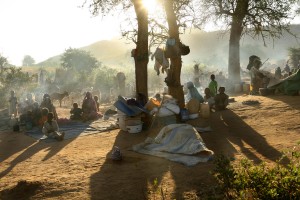February 4, 2011
The Humanitarian Response Index (HRI) 2011 opened with a field mission to Chad from 7th to 12th February. DARA analysed donor governments´ response to the continuing humanitarian crisis and the growing refugee population which is almost completely dependent upon international aid.
Refugees from Central African Republic (CAR), Darfur and internally displaced Chadians make up a population of over 500,000 civilians living under volatile security conditions and sharing limited resources. The unstable relationships between Chad and Sudan and CAR mean that voluntary repatriation might not be possible in 2011.
During the week-long mission, an HRI team interviewed UN agencies, Red Cross/Red Crescent Movement national societies, local and international NGOs, and Chadian authorities.
It is the third time that DARA visits the country, thus allowing for an assessment of how the international community’s response has evolved over time. Read the HRI 2008 Crisis report.
This year, 12 HRI field missions have been planned to Chad, Somalia, Kenya, Iraq, the Occupied Palestinian Territories, Afghanistan, the Democratic Republic of the Congo, Pakistan, Sudan, Yemen, and Haiti. Together these crises received two thirds of global humanitarian funding in 2010. View the calendar. These countries provide a representative sample of the diverse global crises faced by the humanitarian community, including sudden-onset disasters, internal and regional conflicts, protracted crises and complex and forgotten emergencies.
Qualitative data for the HRI comes from the field perceptions gathered through personal interviews during these field missions using a standardised questionnaire on donor practice. More on field missions.
Now in its fifth year, The Humanitarian Response Index was created in 2006 by DARA. It ranks 23 of the wealthiest donors (OECD/ DAC members) by analysing their performance against the Principles of Good Humanitarian Donorship (GHD) that they themselves signed up to. The HRI helps ensure that humanitarian funding has the greatest possible impact for people in critical need of humanitarian aid all over the world.

Share this